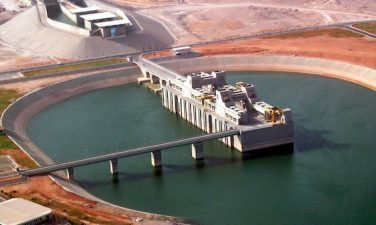Saudi Arabia has always had an acute fresh water shortage problem. The problem has been so severe that a proposal was once considered to literally tow an ice burg from Antarctica all to way to the Kingdom for use as fresh water.
The practicality of constructing desalination plants to extract salt and other minerals from sea water became a much more practical plan, and 27 have now been constructed in the Kingdom, supplying 70% of the country’s drinking water as well as more than 28 million megawatts of electricity.
A new desalination plant, hailed as being the world’s largest, has now been completed in the new Jubail II Industrial Zone in the Kingdom’s Eastern Province.
At a grand ceremony on April 28, King Abdullah pushed the buttons to allow the plant to begin operating. The plant, which cost 16 billion Saudi Ryals (US$ 3.8 billion) is expected to create 800,000 cubic meters of water for cities in the Eastern Province, as well as generate 2,750 megawatts of electricity.
Like other countries on the Arabian Peninsula, including many of the Emirate states, desalination has proven to be the most effective way of solving the country’s water needs.
The existing desalination plants carry fresh water to Saudi cities by means of more than 2,500 miles of water pipes. In a land where summer midday temperatures often reach as high as 130 degrees Fahrenheit , having adequate amounts of electricity and fresh water is crucial to the Kingdom’s development, as well as it’s very survival.
Jubail Industrial City was nothing more than a sleepy fishing village 30 years ago when an ambitious project was begun to turn the area into an important industrial site.
Located on the shores of the Persian Gulf, and just north of the United Arab Emirates, the Jubal Industrial City site has grown into a prime industrial complex with the idea to help bring diversification to an economy that has had too much dependence on petroleum.
The complex has already brought many new economic opportunities to the area, especially for young Saudis, according to Mr. Abdulla Alhazza who owns several companies and other businesses in the area. The industrial projects, with their water and electricity needs supplied by desalination plants, should bolster the local economy and create a “new wave of optimism” according to another Saudi businessman, Imad Al-Dabai.
These projects give a strong indication that countries like Saudi Arabia are focused on creating a better future through projects like the Jubail desalination facility.





This is a fabulous engineering accomplishment that really works. It says it will produce 800,000 cubic meters of water. Is that per second/minute/hour/day/week/month/year? I’m trying to figure out how big the plant has to be to supply a city of 3 million.
Absolutely not, it won’t increase salt concentration. They will take water from oceans and oceans so vast that by taking 800000 cubic meters of water is like water drop in Great Lakes. In addition all the water is evaporate back to atmosphere where they go back to oceans in a form of rains.
kirom too arabestan
Dear Abbey, all,
nature is doing it on over 70% of earth’s surface: Evaporation of water. And eventually it condenses and falls elsewhere on the ground (we call this ‘rain’). And what stays back in the ocean? Right: The somewhat higher concentrated brine. And just because of that is does not become a dead zone. This mentioned process imitates this natural process locally, to have the water where it’s needed.
You should know that the electrical power demand asks for thermal power plants anyway, so why not make a good use of the excess, ‘low quality’ heat to desalinate sea water for a secondary benefit?
Regards – David.
I saw the plant in the way to Jubail, it's really wonderful.
Not only oil but solar power. Solar plant + desalination + algae plant = One sweet way to run things.
Not published was whether the contract was ever paid in full by the Saudi client/project owner
Is that two camels humping in the upper left corner?
What is going to happen to all the salt(dump back into the sea)? A new dead zone? How much water will be accessible if the desalination plants malfunction? Desalination is the worst way to get fresh water, i believe condensation is more sustainable.
Glad you liked the article, Hamid
MAASHALLAAAH
MAY GOD BLESS THIS COUNTRY..
Why should they? They have enough oil to run this thing!
How much energy does this cost to run? It can’t operate on water.
In the story, read:
“This will only enhance the image of our region in the world petrochemical market. This will upgrade our ratings and add value to our economy,” said Abdullah Al-Hazza, who runs several companies with interest in real estate and petrochemicals.
It doesn’t seem like this country is developing desalination to overcome environmental changes, just threats, because the country is so lacking in water. It might be better for them to haul over an iceberg from the North Pole….